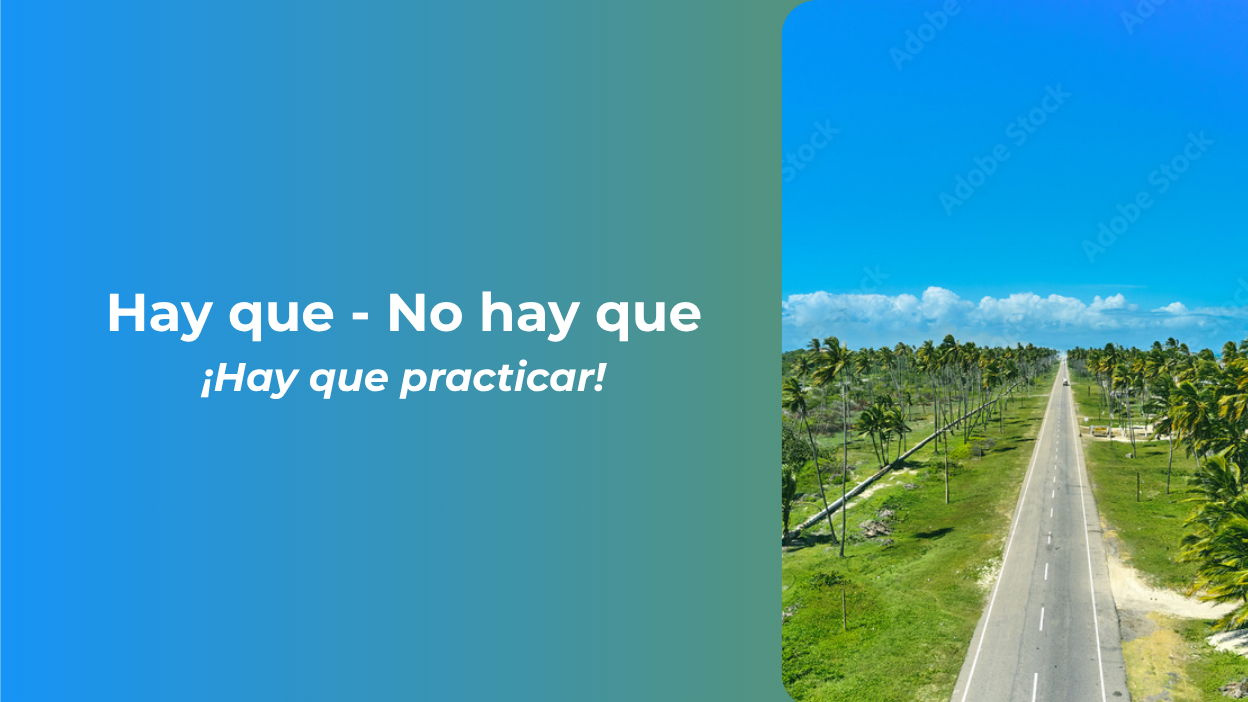Let’s practice How to use HAY QUE / NO HAY QUE in Spanish
✅ How to use HAY QUE + infinitive in Spanish
👉 “Hay que” means “it’s necessary to” or “one must.”
👉 It’s used to express obligation or necessity in general, without specifying who must do the action.
👉 The verb that follows “hay que” is always in the infinitive form (the base form: comer, estudiar, dormir…).
✅ 1) Estructura
HAY QUE + infinitivo → It’s necessary to / One must + verb
- Hay que estudiar todos los días. → It’s necessary to study every day.
- Hay que comer frutas y verduras. → One must eat fruits and vegetables.
- Hay que practicar español. → One must practice Spanish.
NO HAY QUE + infinitivo → It’s not necessary to / One must not + verb
- No hay que correr en los pasillos. → You must not run in the halls.
- No hay que comer tanto azúcar. → One shouldn’t eat so much sugar.
- No hay que gastar dinero en cosas inútiles. → You shouldn’t spend money on useless thing.
✅ 3) Diferencia entre HAY QUE y TENER QUE
| Expresión | Ejemplo | Significado |
|---|---|---|
| Hay que + infinitivo | Hay que estudiar para aprobar. | It is used to speak in general (without a specific subject) |
| Tener que + infinitivo | Yo tengo que estudiar para aprobar. | It is used for a specific person |
- Hay que cuidar el planeta. → People must take care of the planet.
- Tenemos que cuidar el planeta. → We must take care of the planet.
✅ Oraciones afirmativas
- Hay que llegar temprano a clase. – It’s necessary to arrive early to class.
- Hay que hacer ejercicio cada día. – One must exercise every day.
- Hay que decir la verdad. – The truth must be told
- Hay que ahorrar dinero. – It’s necessary to save money.
- Hay que beber agua. – One must drink water.
- Hay que trabajar para tener éxito. → It’s necessary to work to be successful.
✅ Oraciones negativas
- No hay que hablar durante el examen. – No talking during the exam.
- No hay que salir tarde. – It’s not necessary to go out late.
- No hay que comer demasiado. – One must not eat too much.
✅ Oraciones interrogativas
- ¿Hay que estudiar mucho para el examen? – Is it necessary to study a lot for the exam?
- ¿Hay que usar uniforme? – Is it necessary to wear a uniform?
✅ Hay que vs tener que
- Hay que limpiar la casa**.** – It’s necessary to clean the house. Tenemos que limpiar la casa**.** – We have to clean the house.
- Hay que estudiar para el examen**.** – It’s necessary to study for the exam. Tengo que estudiar para el examen. – I have to study for the exam.
- Hay que cocinar hoy**.** – It’s necessary to cook today. Mi mamá tiene que cocinar hoy. – My mom has to cook today.
✅ Expresiones comunes con “hay que”
- Hay que intentarlo. → You have to try.
- Hay que tener paciencia. → You need to be patient.
- Hay que ser amable. → You must be kind.
- Hay que cuidarse. → You need to take care of yourself.
- Hay que disfrutar la vida. → One must enjoy life.
✏️ Ejercicios – Completa con “hay que” o “no hay que”
- ______ estudiar todos los días.
- ______ comer muchas frutas.
- ______ dormir 5 horas.
- ______ hablar durante el examen.
- ______ correr en el pasillo.
- ______ respetar a los profesores.
- ______ pensar mucho en los problemas.
- ______ reciclar.
✏️ Traducción al inglés
- It’s necessary to study every day.
- One must eat lots of fruits.
- It’s necessary to sleep eight hours.
- You must not talk during the exam.
- You must not run in the hallway.
- One must respect the teachers.
- It’s not necessary to worry so much.
- One must recycle the trash.






